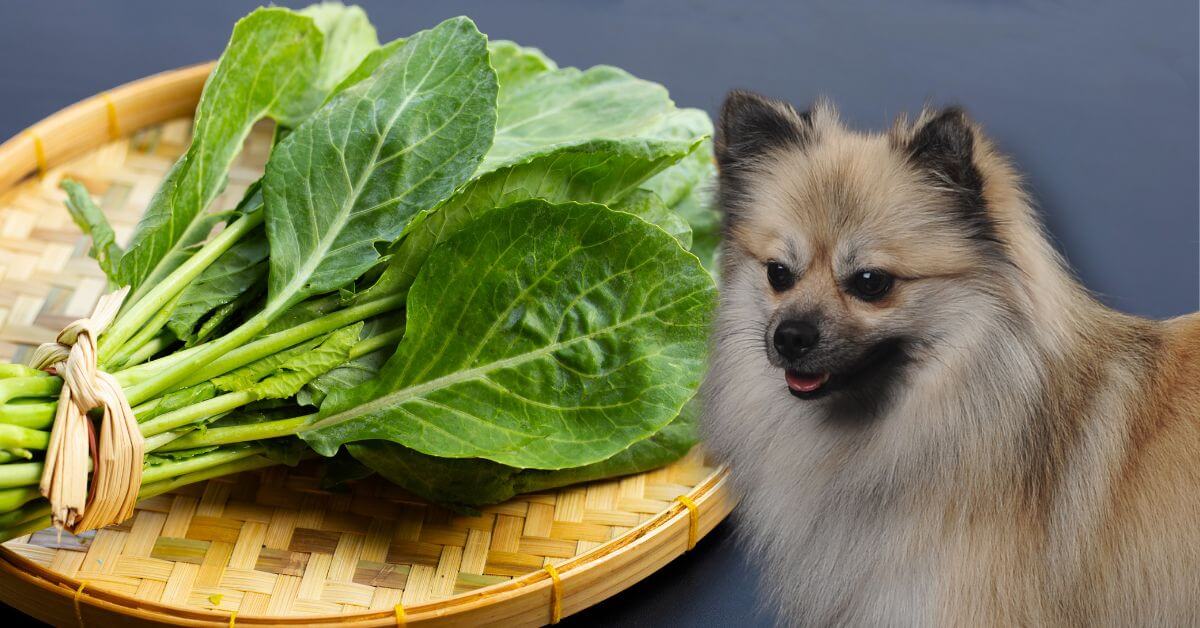Can Dogs Eat Collard Greens?
Yes, dogs can eat collard greens! They are not toxic and can be a healthy addition to your dog’s diet in moderation. Collard greens are very nutritious and rich in vitamins and minerals like vitamins A, C, and K, calcium, and fiber. These nutrients can benefit your dog’s overall health. However, make sure that the collard greens are cooked and unseasoned, as raw greens can be hard for dogs to digest, and added seasonings are never a good idea.

What happens when a dog eats raw collard greens?
When dogs eat raw collard greens, they might have difficulty digesting them. Again, this depends on the amount of collard greens and the size of your dog. Also, there’s a big difference in how they eat them. If they can eat them whole, they may have a difficult time with digestion.
If your dog chews them well, then everything should be fine. While they aren’t toxic, they are full of fiber, which can be hard on their digestive system. You might see symptoms like vomiting and diarrhea for about 24 hours. Due to the high fiber content, diarrhea is more likely to occur. Now, that is not the end of the world. Just make sure your dog has access to water and stays hydrated. Also, try to make the next meal super nutritious.
How to safely feed your dog collard greens?
Collard greens can be an excellent new food for your dog, but there are some considerations to keep in mind:
Do dogs really need fiber?
Yes, dogs do need fiber as part of their diet, but not like humans. They don’t need too much fiber, and some stats say that they need about 1-4 grams of fiber per kilogram of their diet. The exact amount can vary based on their specific health needs, age, and activity level. Fiber is responsible for maintaining a healthy digestive system. There’s a study about how fiber helps gastrointestinal disease in dogs and cats that explains how fiber keeps their digestive system in balance. Fiber does many good things in the gut, like changing how food moves through, helping dogs feel full, aiding digestion, and providing energy for good gut bacteria through fermentation. These benefits can affect the whole body.
Most commercial dog and cat foods include fiber because it’s crucial for their diet. Different fiber types (like those that dissolve in water or are good for gut bacteria) have specific health benefits. Fiber helps with issues like diarrhea, constipation, and hairballs with cats! So, making sure your dog has enough fiber is very important. Whether through commercial dog food or natural sources, the right amount of fiber helps overall well-being and gut health. Call your vet if your dog has difficulties digesting fiber, and don’t overdo it!
Love, life, and fur forever!
FAQs
Can dogs eat collard green stems?
No, dogs shouldn’t eat collard green stems. The hard stems can be a choking hazard and may cause intestinal blockages. Always remove the stems before serving collard greens to your dog.
Can dogs eat raw collard greens?
Dogs can eat raw collard greens, but it’s not recommended. Raw collard greens are tough to digest and can cause stomach upset, leading to symptoms like vomiting and diarrhea. It’s better to serve them cooked and plain.
Can dogs eat cooked collard greens?
Yes, dogs can eat cooked collard greens. Cooking the greens makes them easier to digest. Just make sure they are plain and don’t have seasonings or additives that can harm dogs.
Can dogs eat canned collard greens?
No, dogs shouldn’t eat canned collard greens. Many canned varieties contain harmful additives, seasonings, and preservatives, such as garlic, onion, and salt, that can upset your dog’s stomach and cause health issues.